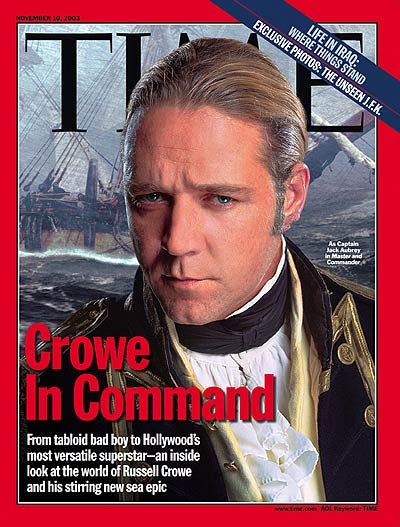20 years ago today, 'Master and Commander: The Far Side of the World' brought violence and violins
Peter Weir’s film, released at the height of Russell Crowe’s run of movie stardom, has endured, despite a less-than-stellar reception back in 2003.
On the eve of the release of a new Napoleon movie, from Ridley Scott, we today mark the 20th anniversary of another epic film, from a major director, that was set during the Napoleonic Wars. That film is Peter Weir’s Master and Commander: The Far Side of the World, a seafaring adventure that arrived in theaters in November 2003.
Based on multiple novels from Patrick O'Brian's Aubrey–Maturin series, Master and Commander is set in 1805, and… I’ll just quote the famed opening titles like its fans on Twitter often do: “Napoleon is master of Europe and only the British fleet stands before him – oceans are now battlefields.”
The film’s action is set almost entirely in the Pacific Ocean aboard the HMS Surprise, where Captain Jack Aubrey (Russell Crowe) is fighting Napoleon’s French forces, with some help from physician and naturalist Stephen Maturin (Paul Bettany), and a large cast of young, male, mostly British actors. The film has, unless I’m forgetting something from multiple viewings, an entirely all-male cast.
There are a couple of strong action scenes — and one of a doctor performing self-surgery, with the help of a mirror — but mostly Master and Commander concerns itself with day-to-day life at sea. Master and Commander was shot on the actual seas, or at least in the water tank that had been built for Titanic six years earlier.
Above all else, though, it’s a portrait of a complex but ultimately healthy male friendship. The kind where the captain and ship surgeon take breaks from their adventures to play classical music duets.
Also, it sports one of Crowe’s best performances, up there with those of L.A. Confidential, The Insider, and Gladiator. It can be easy to forget, based on the current, much hammier phase of his career, that Russell Crowe had a run as one of the world’s biggest stars, and used to get Oscar nominations somewhat frequently.
It’s a film loved by war buffs and naval strategy obsessives — and dads the world over — although it’s not exactly engineered for mass consumption, especially arriving at a time when audiences’ ideas of high-seas adventures looked a lot more like the Pirates of the Caribbean series. The film made just $93 million at the domestic box office, although it did much better overseas. It was also nominated for ten Oscars, including Best Picture although it won just two (for Sound Editing and Cinematography); that was the year that was swept by Return of the King.
Master and Commander, though, has found a new audience in the streaming era, even as its availability moves around to different services (it’s now streaming on Prime Video and Tubi, and is also available on all the major VOD platforms.)
Weir, the director, had a long and eclectic acting career, across five different decades, both in his native Australia and Hollywood. Master and Commander stands with the best of his work, which also includes Picnic at Hanging Rock, Gallipoli, The Year of Living Dangerously, Dead Poets Society, and The Truman Show. While he’s still alive at 79, Weir is considered retired; Master and Commander was Weir’s second-to-last film, before The Way Back seven years later.
There was never a sequel or prequel, despite a great deal of remaining source material, and Weir and Crowe both gave interviews over the years about their interest in doing so. There has also never been an unrelated streaming adaptation of the Aubrey–Maturin books. While making one or the other is certainly an expensive proposition, there’s a lot to mine there- and an audience for it built up over time.



Did Time Magazine print a retraction for the "Most Versatile" claim on the cover after Les Misérables was released?